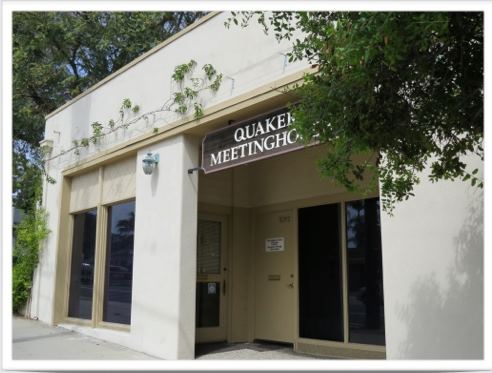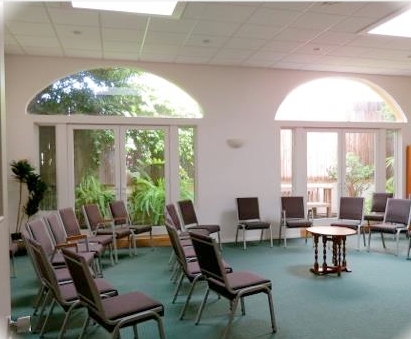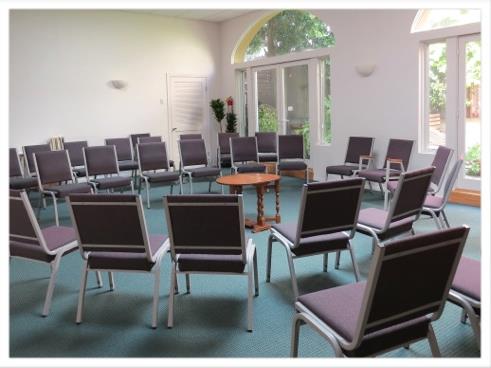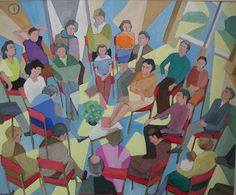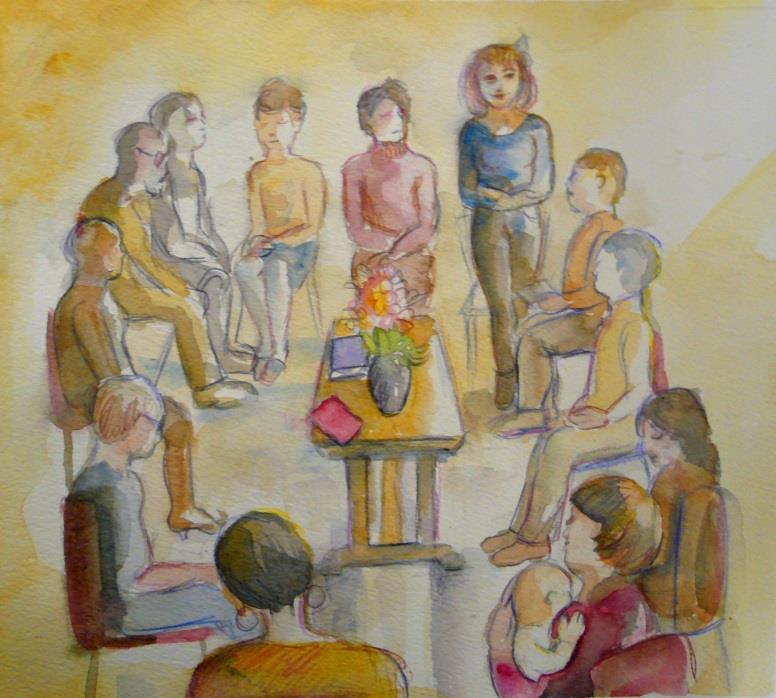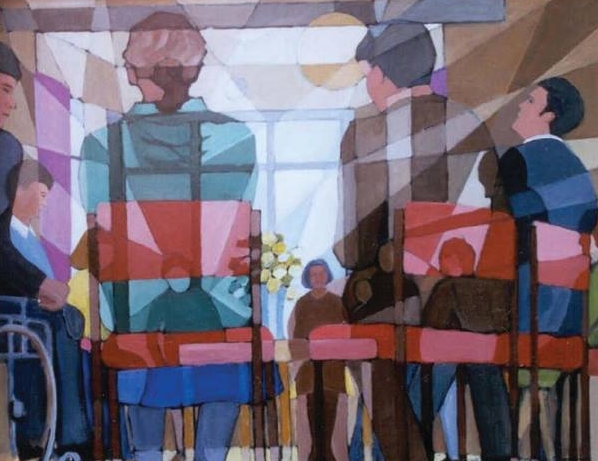"Unprogrammed" Friends meetings follow the tradition of gathering in silence, without the services of a designated pastor or minister.
Quaker Worship
The following was excerpted from the Quaker Information Center.
““The meeting house is not a consecrated edifice, and if there is anything holy about it, it must be the lives of the people who meet there. The Friends feel that there must be a vital and sustained connection between worship and daily life. When their ideal is attained, their meeting is merely the community search for that guidance which they covet for every important act of their lives.””
"Unprogrammed" Friends meetings follow the tradition of gathering in silence, without the services of a designated pastor or minister. Many thoughtful expressions have been written about Friends "meeting for worship." Following are links to a few of them:
- Quaker Meeting for Worship by Douglas Steere.
- Silent Worship and Quaker Values by Marsha D. Holliday
- Draw Breath, a poem by Geoffrey Weeden
- First-Day Thoughts, a poem by John Greenleaf Whittier
- Quaker Meeting as described by the BBC.
The purpose of this article is to offer a practical guide to behaviors, customs and unwritten rules so the newcomer will know what to expect and how to act. Please keep in mind, however, that each meeting (congregation) develops its own traditions and practices, and may depart from some of these guidelines. (To find a meeting for worship, see finding friends.)
Please also consider that many Friends believe that it is better to enter worship without instructions -- to wait patiently in the Light for God to show us how to worship. See What if Quaker Worship Came with Instructions? (a blog by Liz Oppenheimer).
Worship begins when the first person enters the room and takes a seat. This means that if you are entering a room where people have begun to gather, you are entering a meeting for worship that is already in progress. Try to be quiet and unobtrusive within reason. It is OK to smile at someone you recognize, to whisper an apology if you tread on someone's toes, etc. But do not speak aloud or bang around if you can help it.
The practice of sitting together in silence is often called "expectant waiting." It is a time when Friends become inwardly still and clear aside the activities of mind and body that usually fill our attention in order to create an opportunity to experience the presence of the Holy Spirit. It is not a time for "thinking," for deliberate, intellectual exercise. It is a time for spiritual receptivity, so it is important not to clog one's mind with its own busy activities. Nonetheless, thoughts will occur in the silence. Some thoughts will be distractions and should be set aside. (Make that shopping list later.) But some thoughts or images or feelings may arise that seem to come from a deeper source and merit attention. If you are visited by a spiritual presence, if you seem to experience perceptions that are drawn from a deeper well or are illuminated with a brighter light, then let those impressions dwell in you and be receptive to the Inward Teacher. Each person finds his or her own ways of "centering down," or entering deep stillness during meeting.
You are encouraged to explore ways to center down, until you discover what works for you. It may help to talk to others, or read personal accounts, such as the one linked above by Douglas Steere. However, there are two common guidelines about entering worship:
- To "come with heart and mind prepared." Worship will be more meaningful if you arrange to enter meeting in a relaxed and calm frame of mind, rather than in a rushed frenzy, and if you ready yourself during the week through prayer, contemplation, reading, or other practices; and
- To bring "neither a determination to speak nor a determination to remain silent." In other words, if you offer a spoken message during worship, it should arise from a spiritual prompting that happens during worship--one that you are ready for but have not planned.
From time to time, an individual may be moved to offer a "message" (or "spoken ministry") to the group. Spoken messages may occur many times during a meeting, or there may be none at all. Such a message is delivered by an individual, but is understood to be coming through that person from God. When such a message is delivered, no outward response is expected from you--in fact, it is not Friends' practice to offer vocal approvals, or even turn around in one's seat to look at the speaker. (It is more customary to laugh at humor. If a message is given in the form of song, others may join in the singing if the singer invites it.) Try to make yourself receptive to the message and let it reach you, even if you find yourself resisting it. There may be a kernel of truth in it that will speak to you. If that does not happen, trust that the message was meant for others, and return to your own worship.
If you find yourself "prompted" to offer a message, the first step is to ask yourself whether it is a genuine leading of the Spirit. Does the urge to speak seem to arise from a deeply spiritual motion, rather than simply being a desire to share your own active thoughts? Does it seem that the message is intended to be given to the assembly, rather than being personal guidance just for you, or something you may feel called to say to an individual later? Is your inclination to speak free of personal motives or "hidden agendas"? Does it seem that now is the moment that you are called to speak? (These are not easy things to discern, and it takes practice, including trial and error, to become confident. Do not be afraid to be wrong!)
When you speak:
- In most meetings it is customary to stand up. In very small meetings a speaker may remain seated. Speak loudly and clearly--many meeting houses have poor accoustics, and there may be people behind you.
- While audibility is appreciated, rhetorical polish is not expected. If your words are awkward or halting, they will simply be accepted as authentic.
- When the inspiration to speak ends, simply stop. Not all messages run smoothly to a perfect conclusion, and some of the most meaningful ones may break off in the middle or lack a neat closure. That's OK.
- Allow a period of silence between messages. Do not speak for several minutes after a previous speaker.
- It is considered inappropriate to dispute a previous message. Meeting for worship is not a time for argument or conversation, and each message should stand by itself, independent of any others. It is not uncommon, however, for a speaker to acknowledge that their thoughts have been inspired by an earlier message.
- It is extremely rare for a person to speak more than once in a single meeting for worship.
Other behavior during worship:
- Try to avoid making noise, but if you have to unwrap a cough drop, or get up to leave the room temporarily, just do it as unobtrusively as you comfortably can. It is usually considered inappropriate to enter or leave the room while someone is offering a message, however.
- Some Friends will spend a short time in worship reading the Bible or other inspirational literature. There may or may not be Bibles lying around the room. If there are, you may pick one up and open it if you are moved to do so.
At the close of worship, someone will signal the end by shaking hands with a neighbor. Then everyone shakes hands with those around them. Customs vary from this point, but in many meetings, someone will stand and invite visitors to introduce themselves and there may be announcements before people rise from their seats.
Other things to know about:
- If you are bringing children, it is wise to call the clerk or the Meeting's contact number in advance, or arrive a little early, to ask what provisions the Meeting makes for children. Many meetings follow the practice of having children sit with the adults for the first or last quarter hour, then offer some kind of children's programming for the rest of the time. A child who prefers to stay in worship for the entire period is welcome to do so if she or he can remain quiet.
- Dress: A wide variety of clothing is appropriate for Friends meeting. It is not a Quaker tradition to wear one's "Sunday finest" to worship, although if you are more comfortable doing so, that is perfectly acceptable. The Quaker tradition of "plain dress" may be expressed in worship by the wearing of clean levis and a work shirt, at one extreme, or professional office clothing at the other. Anything clean and reasonably modest is OK.
- Facing benches: older, historical meetinghouses often have a section of benches that are somehow identified as being at the "head" of the room: by their placement or by a slight elevation, or a different appearance. Historically, those benches were reserved for the meeting's "ministers" and "elders." Modern Friends vary widely in their use of these benches--in some Meetings anyone sits on them, in others no one may sit on them, and in some, families or committees may rotate "turns" on the facing bench. Often it is someone on a facing bench who "breaks meeting" by shaking hands. Until you know the customs of the meeting you are visiting, be aware that it may be a faux pas to sit on a facing bench.
- Opening or closing exercises: a few unprogrammed meetings begin or end worship with singing and perhaps a Bible reading or other prepared text.
- "Twilight meetings": an unusual but growing practice in some meetings is that after meeting for worship has been "broken," the assembly continues in silence for a period of time during which members are invited to share thoughts or reflect on the morning's worship. (Also called "afterthoughts," "second meeting," and other names.)
- Speaking to someone about their message: if someone offered spoken ministry that was meaningful to you, it is good form to tell them after the meeting that you appreciated the message, or to thank them for the service of delivering the message. However, do not assume that the speaker will want to have an in-depth discussion about what they said. Speaking in worship can leave one feeling vulnerable or tender, and the person who spoke should be seen as the messenger, not necessarily the source of the message. Don't hold them responsible for what God says through them, and don't blame them for any imperfections in their delivery of the message. Unless they do seem eager to talk about it, take up your differences with God.
- Treatment of visitors: many unprogrammed Friends are loathe to "proselytize." It is likely that after worship, people will speak to you and perhaps invite you to sign a guest book. But compared to many other Protestant denominations, Friends' treatment of newcomers may seem shy, cautious or lukewarm. Please do not take this personally. They are letting you make up your own mind about Quakers, and they mean it well.
NOTE: Every single "rule" and practice described above is sometimes ignored. Use these guidelines as a way to know a little about "Quaker culture," but don't take them too seriously, and don't be surprised when you see a lifelong Quaker do something quite different!
Chel Avery for Quaker Information Center

